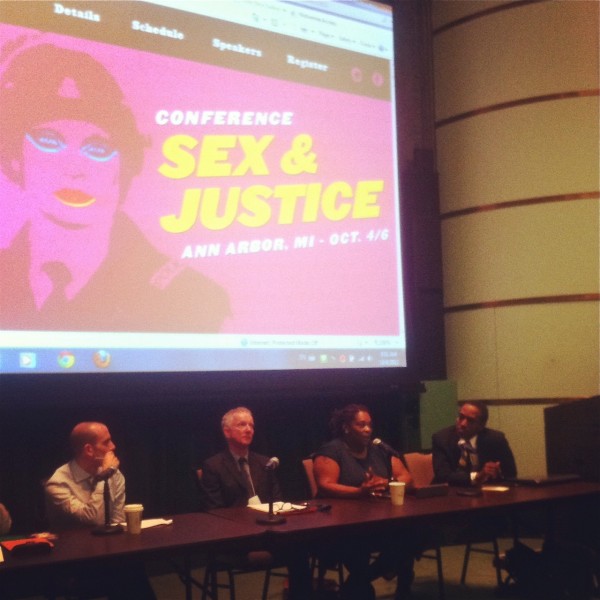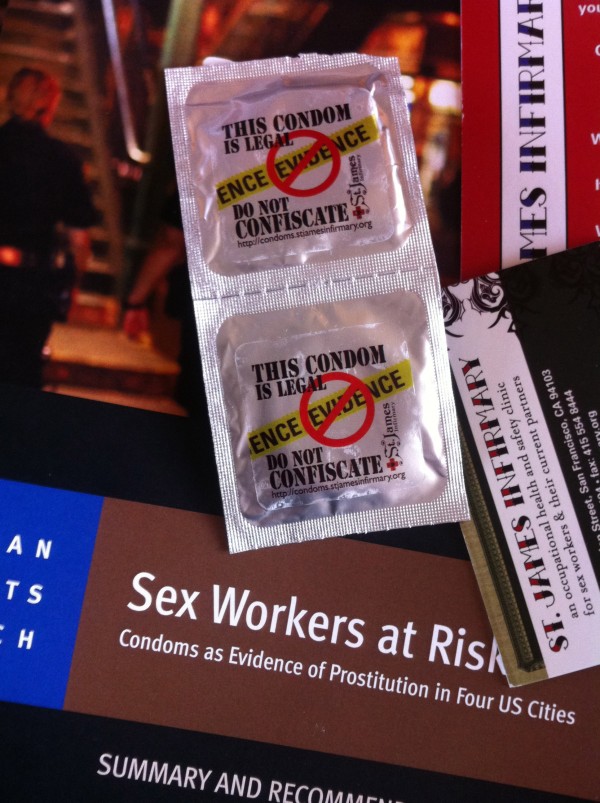
Long ago before I had ever begun to use the term “sex work” or could even have guessed at what aå Sex and Justice conference would entail, I began processing my experiences in sex/work by telling my story. For a long time I kept that story in the place where I had left it: journals, then later in an edited and now-forgotten anonymous blog. I open up about parts of it here and there and I wonder, and worry, about the consequence of being completely open and honest and telling the whole story in a place that is not private or anonymous.
I went to the Sex and Justice conference in Ann Arbor to try to figure out what it is about sex that invites regulation and criminalization. More and more, however, I began to focus on the act of telling stories about sex (particularly when criminal law is a part of it): the consequences, obligations, and complications of telling something that is personal and yours alone. Speaker after speaker, in the context of “sex and justice,” had something to say about sex workers telling the truth of their experience.
At the first plenary (Sex and the State: Registries, Rights and Punishment) Deon Haywood, executive director of Louisiana’s Women With a Vision had 10 minutes to talk about her group’s successful “NO Justice” campaign. The campaign had successfully overturned a 19th century “Crimes Against Nature” law, which required people who offered oral or anal sex for money to register as sex offenders—disproportionately affecting poor women, people of color and trans individuals.
Though the law had been challenged before, Haywood said that previous challenges had not come from the point of view of the people it affects.
“We started holding story circles where everyone talked about their experiences. The people who live with this every day are the experts; they know what it is like to take your kid to daycare and have to show your ID that says “sex offender” and then your kid can’t get in and you lose your job because you can’t get daycare.”
The women who had been criminalized by the law came up with the name NO Justice and were the force behind the campaign.
“That’s what changed that law: putting people who were directly affected in front of the people who make those laws, because that’s who they should be answering to.”
Though her talk was short, Haywood’s story resonated through the rest of the conference; Nan Hunter called it “a textbook case on how to do advocacy.” The success of Women With a Vision’s campaign was bound to the act of the people affected by criminalization telling the truths of their lives.
The words “Women With a Vision” and “Louisiana” were mentioned at almost every session I attended—sessions on HIV criminalization, sex offender registries and anti-trafficking policies and campaigns—and so did this theme of people telling their stories, not the stories that their so-called advocates want them to tell, and not the one-dimensional narratives that suppress difficult questions, but real stories about complicated lives.
Later on that first day, Melissa Petro spoke about the outcome of her telling hers: a not-trafficked, non-coerced experience selling sex on Craigslist that she wrote about for Huffington Post in 2010 as a way to address the hysteria surrounding Craigslist’s Adult Services at the time. Her academic background in creative non-fiction told her that she had the right to tell her story under her own name; her belief in the freedom of speech told her that she would be protected for doing so. The reality was she was that the media whipped up a storm of moral outrage and she subsequently lost her career as an elementary school teacher. My understanding is that she didn’t lose her job for working in a criminalized industry years ago, but because of the disruption that followed talking about it.
Petro stressed the need for sex workers to have spaces to tell their stories and mentioned her work with the Red Umbrella Project, an organization that amplifies “voices of people in the sex trades through media, storytelling, & advocacy trainings.” The sex positive community, she said, had not offered that place to her. She felt that her story was neither the “everything-is-awful” narrative of the people campaigning against sex work, nor the “empowering” experience she felt the sex-positive community wanted her to represent.
Later that afternoon, in her Social Justice Issues, Sex-Positive Thought, and Sexological Perspectives workshop, Carol Queen repeated the mantra “nothing about us without us,” which was repeated several times through the rest of the conference. Notably by Naomi Akers in her presentation the next day: “The U.S. War on Sex Workers,” where she presented just some of the U.S.’ responses to sex work: “end demand” campaigns; condoms as evidence policies; registering prostitutes as sex offenders; and conflating prostitution with human trafficking, to name just a few.
Akers began her presentation by talking about her experience as one of Donna Hughes’ research subjects in San Francisco in the 1990s. Hughes took Akers to a meeting about exotic dancers’ unionizing efforts at Hastings Law and told her that she wanted her to say that no amount of legitimacy for the sex industry could be tolerated because prostitution implicitly means violence against women and children. Akers refused to say it.
“It’s really easy,” Akers said, “for former sex workers to be used by anti-prostitution feminists to tell a certain part of their story, where there is trauma involved, to push an agenda.”
Anti-prostitution feminists want sex workers to need to be rescued. “Support from feminism,” said Carol Queen in her workshop, “only comes when sex workers decry their involvement in prostitution.” You have to be “innocent.”
The last plenary session featured Amber Hollibaugh who gave a passionate, mobilizing speech on the necessity of recognizing that our stories are often very complicated and not innocent.
 “I have been thinking a lot about the question of sex and innocence because sex is usually framed in the context of innocence and its loss—an enormously dangerous idea. We need to address this because as long as innocence is the definition of the right to be a sexual person, we will always lose. Because if we tell the truth about desire; tell the truth about our lives; tell the truth about who we are; what we do or want to do or try not to do, we will never be able to be innocent.”
“I have been thinking a lot about the question of sex and innocence because sex is usually framed in the context of innocence and its loss—an enormously dangerous idea. We need to address this because as long as innocence is the definition of the right to be a sexual person, we will always lose. Because if we tell the truth about desire; tell the truth about our lives; tell the truth about who we are; what we do or want to do or try not to do, we will never be able to be innocent.”
When you are building a movement for sex and justice, she said, you need to ask very complicated questions about whether the right kind of people are being brought to represent the narrative that we want to move forward around sex and justice. It is complicated, she said, to expose the cracks in your own house—equality movements often try to bring certain narratives to the table and hide other ones.
I began to appreciate the relation between storytelling and justice, and saw how telling the truth of our lives can be a vehicle for social change. Sex workers have been doing this, of course, for many years. In just my few years I was lucky enough to have places like $pread, Sex Worker Literati, The Rumpus and Tits and Sass. But still, I have struggled with telling the parts of my story that complicate the things that I advocate for.
“When you talk about the Excluded Workers Congress, the Texas Four, sex work organizing, HIV criminalization, you are talking about people with complicated lives that have to be defended around a reality of how they live and the choices they’ve been forced to make, and what they do in spite of and because of these choices. They are not one-dimensional; they are not the right kind of people.”
Hollibaugh said that she didn’t feel represented by the agencies she loved. Even the women’s rights movement that she said had saved her. Sometime telling the truth of our stories can make us feel excluded from movements we thought we belonged to—I know I’ve felt it, particularly when I’ve sat at the feminist table. Melissa Petro even felt it from the sex-positive community. Many speakers talked about being encouraged or coerced into fitting personal stories of sex work into an acceptable narrative and of not complicating them. Each of the speakers presented a case for, or their own experience of, refusing to make that narrative fit. I have often kept quiet about uglier parts of my history because I don’t want my words to be used as a way of advancing an anti-sex/work agenda that I disagree with. I feel more now that (for me, a person who is now distanced from an business I worked in for really only about five years) to truly move toward justice, telling the truth, including the difficult parts, is necessary.
I was left thinking about the power of storytelling: that it can help overturn a centuries-old law; ruin a career; be manipulated to discredit the storyteller; open discourse; create understanding, or be silenced because it’s not the right kind of narrative. I still find myself a little afraid of that power, but when I see that my truth creates doubt in the people who think they know mine better than me, I feel more compelled to tell it.
Hey, nice article and thanks for the props. It was actually Melissa Farley and not Donna Hughes.